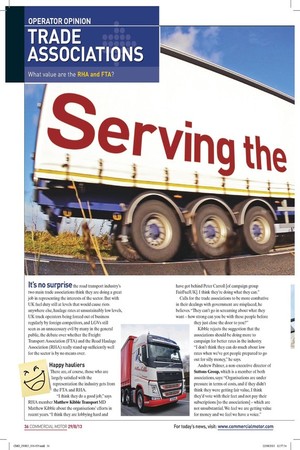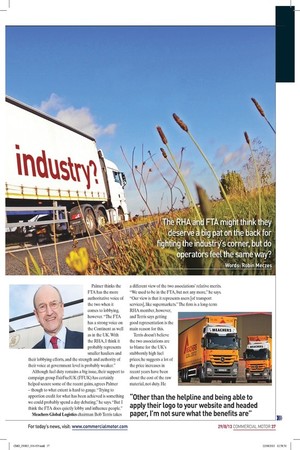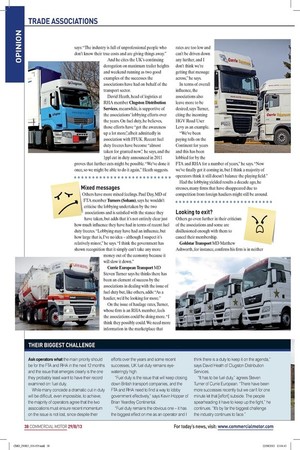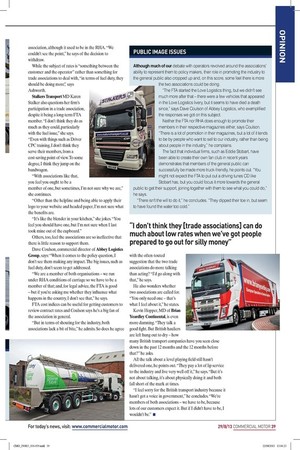TRADE ASSOCIATIONS
Page 29

Page 30

Page 31

Page 32

If you've noticed an error in this article please click here to report it so we can fix it.
What value are the RHA and FTA?
The RHA and FTA might think they deserve a big pat on the back for fighting the industry's corner, but do operators feel the same way? Words: Robin Meczes
It's no surprise the road transport industry's two main trade associations think they are doing a great job in representing the interests of the sector. But with UK fuel duty still at levels that would cause riots anywhere else, haulage rates at unsustainably low levels, UK truck operators being forced out of business regularly by foreign competitors, and LGVs still seen as an unnecessary evil by many in the general public, the debate over whether the Freight Transport Association (FTA) and the Road Haulage Association (RHA) really stand up sufficiently well for the sector is by no means over. Happy hauliers \
There are, of course, those who are largely satisfied with the representation the industry gets from the FTA and RHA. "I think they do a good job," says RHA member Matthew Kibble Transport MD Matthew Kibble about the organisations' efforts in recent years. "I think they are lobbying hard and "I think they do a good job," says RHA member Matthew Kibble Transport MD Matthew Kibble about the organisations' efforts in recent years. "I think they are lobbying hard and
have got behind Peter Carroll [of campaign group FairFuelUK]. I think they're doing what they can."
Calls for the trade associations to be more combative in their dealings with government are misplaced, he believes. "They can't go in screaming about what they want — how strong can you be with these people before they just close the door to you?"
Calls for the trade associations to be more combative in their dealings with government are misplaced, he believes. "They can't go in screaming about what they want — how strong can you be with these people before they just close the door to you?"
Kibble rejects the suggestion that the associations should be doing more to campaign for better rates in the industry. "I don't think they can do much about low rates when we've got people prepared to go out for silly money," he says.
Andrew Palmer, a non-executive director of Suttons Group, which is a member of both associations, says: "Organisations are under pressure in terms of costs, and if they didn't think they were getting fair value, I think they'd vote with their feet and not pay their subscriptions [to the associations] — which are not unsubstantial. We feel we are getting value for money and we feel we have a voice."
Palmer thinks the FTA has the more authoritative voice of the two when it comes to lobbying, however. "The FTA has a strong voice on the Continent as well as in the UK. With the RHA, I think it probably represents smaller hauliers and their lobbying efforts, and the strength and authority of their voice at government level is probably weaker."
Palmer thinks the FTA has the more authoritative voice of the two when it comes to lobbying, however. "The FTA has a strong voice on the Continent as well as in the UK. With the RHA, I think it probably represents smaller hauliers and their lobbying efforts, and the strength and authority of their voice at government level is probably weaker."
Although fuel duty remains a big issue, their support to campaign group FairFuelUK (FFUK) has certainly helped secure some of the recent gains, agrees Palmer — though to what extent is hard to gauge. "Trying to apportion credit for what has been achieved is something we could probably spend a day debating," he says. "But I think the FTA does quietly lobby and influence people." Meachers Global Logistics chairman Bob Terris takes
a different view of the two associations' relative merits.
"We used to be in the FTA, but not any more," he says. "Our view is that it represents users [of transport services], like supermarkets." The firm is a long-term
RHA member, however, and Terris says getting good representation is the main reason for this. Terris doesn't believe the two associations are to blame for the UK's stubbornly high fuel prices; he suggests a lot of the price increases in recent years have been about the cost of the raw material, not duty. He
says: "The industry is full of unprofessional people who don't know their true costs and are giving things away."
And he cites the UK's continuing derogation on maximum trailer heights and weekend running as two good examples of the successes the associations have had on behalf of the transport sector.
David Heath, head of logistics at RHA member Clugston Distribution Services, meanwhile, is supportive of the associations' lobbying efforts over the years. On fuel duty, he believes, those efforts have "got the awareness up a lot more'; albeit admittedly in association with1,I,UK. Recent fuel duty freezes have become "almost taken for granted now'; he says, and the lppl cut in duty announced in 2011 proves that further cuts might be possible. "We've done it once, so we might be able to do it again," Heath suggests.
David Heath, head of logistics at RHA member Clugston Distribution Services, meanwhile, is supportive of the associations' lobbying efforts over the years. On fuel duty, he believes, those efforts have "got the awareness up a lot more'; albeit admittedly in association with1,I,UK. Recent fuel duty freezes have become "almost taken for granted now'; he says, and the lppl cut in duty announced in 2011 proves that further cuts might be possible. "We've done it once, so we might be able to do it again," Heath suggests. • • • • • • • • • • • • • • • • • • • • • • • • • • • Mixed messages \ %v. Others have more mixed feelings. Paul Day, MD of II FTA member Turners (Soham), says he wouldn't criticise the lobbying undertaken by the two associations and is satisfied with the stance they have taken, but adds that it's not entirely clear just how much influence they have had in terms of recent fuel duty freezes. "Lobbying may have had an influence, but how large that is, I've no idea although I suspect it's relatively minor," he says. "I think the government has shown recognition that it simply can't take any more
money out of the economy because it will slow it down."
Currie European Transport MD Steven Turner says he thinks there has been an element of success by the associations in dealing with the issue of fuel duty but, like others, adds: "As a haulier, we'd be looking for more." On the issue of haulage rates, Turner, whose firm is an RHA member, feels the associations could be doing more. "I think they possibly could. We need more information in the marketplace that
rates are too low and can't be driven down any further, and I don't think we're getting that message across," he says.
In terms of overall influence, the associations also leave more to be desired, says Turner, citing the incoming HGV Road User Levy as an example.
"We've been paying tolls on the Continent for years and this has been lobbied for by the FTA and RHA for a number of years," he says. "Now we've finally got it coming in, but I think a majority of operators think it still doesn't balance the playing field."
"We've been paying tolls on the Continent for years and this has been lobbied for by the FTA and RHA for a number of years," he says. "Now we've finally got it coming in, but I think a majority of operators think it still doesn't balance the playing field."
Had the lobbying yielded results a decade ago, he stresses, many firms that have disappeared due to competition from foreign hauliers might still be around. • • • • • • • • • • • • • • • • • • • • • • • • • • •
Looking to exit?
Others go even further in their criticism of the associations and some are disillusioned enough with them to cancel their membership. Goldstar Transport MD Matthew Goldstar Transport MD Matthew Ashworth, for instance, confirms his firm is in neither
association, although it used to be in the RHA. "We couldn't see the point," he says of the decision to withdraw.
While the subject of rates is "something between the customer and the operator" rather than something for trade associations to deal with, "in terms of fuel duty, they should be doing more'; says Ashworth.
While the subject of rates is "something between the customer and the operator" rather than something for trade associations to deal with, "in terms of fuel duty, they should be doing more'; says Ashworth.
Stalkers Transport MD Karen Stalker also questions her firm's participation in a trade association, despite it being a long-term FTA member. "I don't think they do as much as they could, particularly with the fuel issue," she says. "Even with things such as Driver CPC training, I don't think they serve their members, from a cost-saving point of view. To some degree, I think they jump on the bandwagon.
"With associations like that, you feel you ought to be a member of one, but sometimes, I'm not sure why we are," she continues.
"With associations like that, you feel you ought to be a member of one, but sometimes, I'm not sure why we are," she continues.
"Other than the helpline and being able to apply their logo to your website and headed paper, I'm not sure what the benefits are.
"It's like the blender in your kitchen," she jokes. "You feel you should have one, but I'm not sure when I last took mine out of the cupboard."
Others, too, feel the associations are so ineffective that there is little reason to support them.
Dave Coulson, commercial director of Abbey Logistics Group, says: "When it comes to the policy question, I don't see them making any impact. The big issues, such as fuel duty, don't seem to get addressed.
"We are a member of both organisations — we run under RHA conditions of carriage so we have to be a member of that; and, for legal advice, the FTA is good — but if you're asking me whether they influence what happens in the country, I don't see that," he says.
FTA cost indices can be useful for getting customers to review contract rates and Coulson says he's a big fan of the association in general. "But in terms of shouting for the industry, both associations lack a bit of bite," he admits. So does he agree
with the often-touted suggestion that the two trade associations do more talking than acting? "I'd go along with that," he says.
He also wonders whether two associations are called for. "You only need one — that's what I feel about it," he states.
Kevin Hopper, MD of Brian Yeardley Continental, is even more damning. "They talk a good fight. But British hauliers are left hung out to dry — how many British transport companies have you seen close down in the past 12 months and the 12 months before that?" he asks.
Kevin Hopper, MD of Brian Yeardley Continental, is even more damning. "They talk a good fight. But British hauliers are left hung out to dry — how many British transport companies have you seen close down in the past 12 months and the 12 months before that?" he asks.
All the talk about a level playing field still hasn't delivered one, he points out. "They pay a lot of lip service to the industry and live very well off it," he says. "But it's not about talking, it's about physically doing it and both fall short of the mark at times. "I feel sorry for the British transport industry because it hasn't got a voice in government," he concludes. "We're members of both associations — we have to be, because lots of our customers expect it. But if I didn't have to be, I wouldn't be." •













































